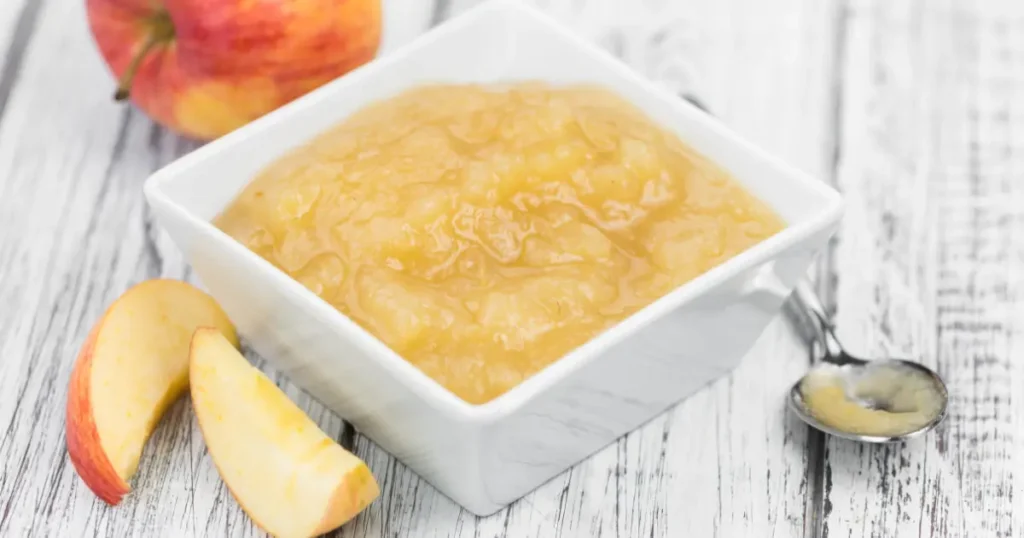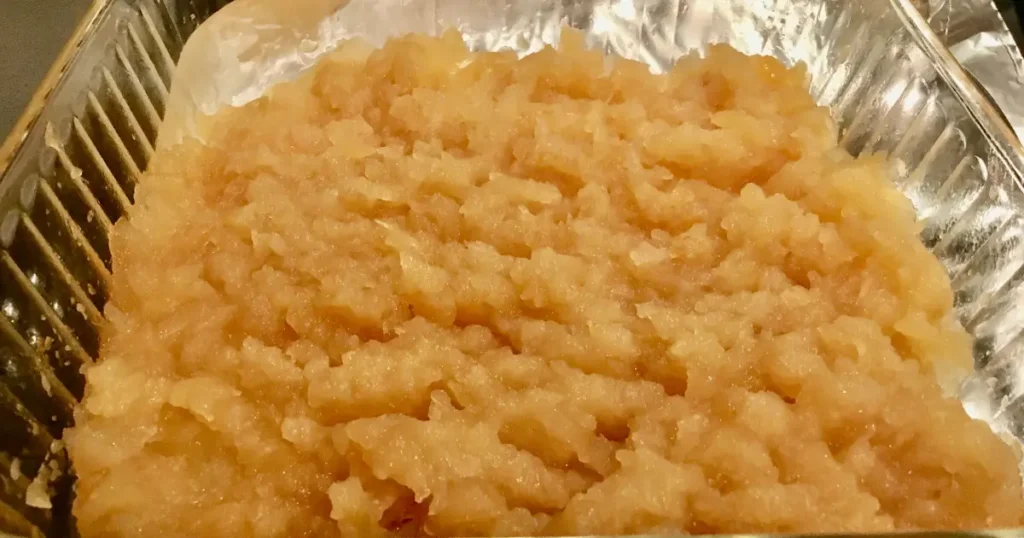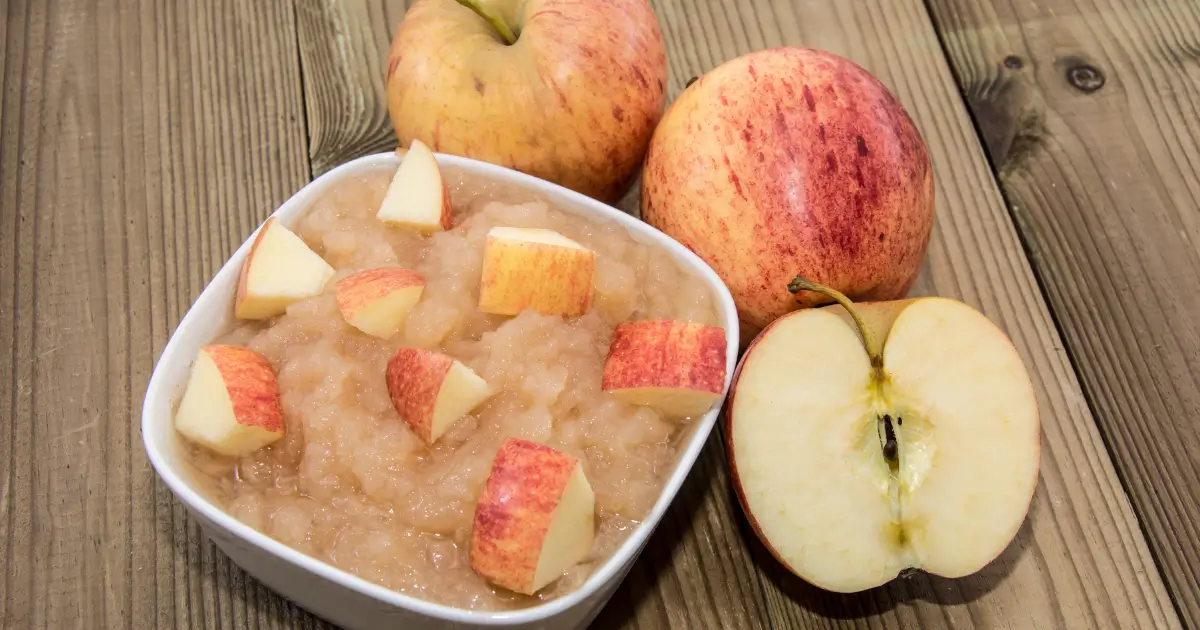Can Dogs Eat Applesauce: 5 Amazing Benefits & Serving Tips
Many dog owners wonder, “Can dogs eat applesauce?” while looking for healthy, appealing treats for their canine companions. The simple answer is yes—dogs can safely enjoy applesauce in moderation, with some important considerations. This smooth, sweet treat can be a nutritious addition to your dog’s diet when served properly. Let’s explore everything you need to know about feeding applesauce to your furry friend.
Table of Contents
Is Applesauce Safe for Dogs?
Yes, when given in moderation, applesauce is generally safe for dogs. For pet owners asking, “Can dogs have applesauce?” it’s important to understand that the plain, unsweetened variety is the only acceptable option. Plain applesauce contains beneficial nutrients found in whole apples but in a form that’s easier for some dogs to consume.
When considering whether can dogs eat apple sauce safely, remember that not all applesauce is created equal. Commercial varieties often contain added sugars, preservatives, and sometimes artificial sweeteners like xylitol, which is extremely toxic to dogs. Always check ingredients carefully before sharing this treat with your pet.
5 Surprising Benefits of Applesauce for Dogs
When pet owners wonder, “Is applesauce good for dogs?” they’ll be pleased to learn there are several potential health benefits. Here are five ways this soft treat can benefit your canine companion:
1. Easy Digestibility
Applesauce is easier to digest than raw apples, making it an excellent option for:
- Senior dogs with dental issues
- Dogs recovering from illness
- Puppies transitioning to solid foods
- Dogs with sensitive digestive systems
The cooking process breaks down the cell walls of the apple, making nutrients more bioavailable and reducing the work your dog’s digestive system needs to do.
2. Rich in Vitamins and Antioxidants
When dogs eat applesauce, they receive beneficial nutrients, including:
- Vitamin C: is an antioxidant that boosts immunity.
- Vitamin A: Promotes healthy skin, coat, and vision
- Antioxidants: Help combat free radical damage and may support overall health
- Polyphenols: Plant compounds with anti-inflammatory properties
These nutrients can support your dog’s health as part of a balanced diet.
3. Source of Dietary Fiber
Applesauce contains soluble fiber that can help regulate your dog’s digestive system. This can be particularly beneficial for:
- Dogs with occasional constipation
- Pets recovering from gastrointestinal upset
- Dogs need gentle dietary fiber
The pectin in applesauce acts as a prebiotic, potentially supporting healthy gut bacteria.
4. Low in Fat and Calories
For dogs that need weight management, unsweetened applesauce can be a satisfying low-calorie treat option. This makes it appropriate for:
- Dogs on weight management plans
- Less active or senior pets
- Dogs that need frequent rewards during training
When pet owners ask, “can dogs eat applesauce?” while managing their pet’s weight, it can be a better alternative to many commercial treats.
5. Hydration Support
With its high water content, applesauce can provide additional hydration, which is especially helpful for:
- Dogs in hot weather
- Pets that don’t drink enough water
- Dogs recovering from illness
Applesauce’s moisture content can help your dog consume more fluids each day.
Pears are another excellent fruit option for dogs, offering similar fiber benefits with a different nutrient profile that includes copper and vitamin K.
Potential Risks of Feeding Applesauce to Dogs

While applesauce can be beneficial, there are some important considerations when determining if can dogs have applesauce safely:
Added Sugars
Sugars are added to a lot of commercial applesauce products, which can:
- Contribute to weight gain
- Increase risk of diabetes
- Causes dental problems
- Lead to digestive upset
Always opt for unsweetened applesauce for your dog.
Artificial Sweeteners
Some applesauce varieties contain artificial sweeteners, particularly xylitol, which is extremely toxic to dogs even in small amounts. Xylitol can cause:
- Hypoglycemia, or low blood sugar, is caused by rapid insulin release.
- Liver failure
- Seizures
- Death in severe cases
Always check ingredient labels carefully before determining if dogs eat applesauce of a particular brand.
Preservatives and Additives
Commercial applesauce often contains preservatives, artificial flavors, and other additives that may not be ideal for your dog’s digestive system.
Allergic Reactions
Though rare, some dogs may have allergic reactions to apples. Signs to watch for include:
- Itchy skin or hives
- Facial swelling
- Difficulty breathing
- Gastrointestinal upset
Consult your veterinarian and stop using applesauce if your dog exhibits any of these symptoms.
How to Safely Serve Applesauce to Your Dog
Use these guidelines when giving your dog applesauce:
Choose the Right Type
For dogs, the best applesauce is:
- Unsweetened: No added sugars
- Free from additives: No preservatives, artificial flavors, or colors
- Xylitol-free: Check labels carefully
- Organic, if possible: To minimize pesticide exposure
Homemade applesauce is often the best option, as you can control all ingredients.
Proper Serving Sizes
Moderation is key when serving applesauce to dogs. Here’s a guide based on dog size:
| Dog Size | Recommended Serving | Frequency |
|---|---|---|
| Small (under 20 lbs) | 1-2 teaspoons | 1-2 times per week |
| Medium (20-50 lbs) | 1-2 tablespoons | 1-2 times per week |
| Large (over 50 lbs) | 2-3 tablespoons | 1-2 times per week |
Remember that treats, including applesauce, should make up no more than 10% of your dog’s daily caloric intake.
Serving Suggestions
Applesauce can be added to your dog’s diet in several ways:
- Frozen treats: Freeze small portions for a cooling summer treat
- Food topper: Add a spoonful to regular meals for extra flavor
- Medication vehicle: Used to disguise pills or supplements
- Training rewards: Use small amounts for special training treats
When dogs eat applesauce as an occasional treat rather than a dietary staple, it can be a healthy addition to their routine.
Homemade Applesauce for Dogs

Making your own applesauce ensures you know exactly what your dog is consuming. Here’s a simple dog-friendly applesauce recipe:
Ingredients:
- 4 apples (choose a sweet variety like Gala or Fuji)
- 1/2 cup water
- Cinnamon (optional, a small pinch only)
Instructions:
- Wash, core, and chop apples (remove all seeds)
- Place apples and water in a pot
- Simmer until apples are soft (approximately 15-20 minutes)
- Mash or blend to the desired consistency
- Cool completely before serving
- You can freeze it in portions or keep it in the fridge for up to five days.
This homemade version allows you to control all ingredients and avoid additives, making it the ideal option when considering whether can dogs eat apple sauce safely.
When Applesauce Can Be Especially Beneficial
There are certain situations when applesauce may be particularly helpful for dogs:
During Illness or Recovery
When dogs are recovering from gastrointestinal upset, applesauce can be:
- Easy to digest
- Gentle on the stomach
- Appealing to dogs with reduced appetite
Always consult your veterinarian before offering any human food to a sick dog.
For Medication Administration
Many pet owners find that applesauce can help when:
- Giving pills or capsules
- Administering liquid medications with unpleasant tastes
- Encouraging a reluctant dog to take supplements
The sweet taste and smooth texture can mask medications effectively.
For Senior Dogs
Older dogs may particularly benefit from applesauce because:
- It’s soft and requires minimal chewing
- It provides hydration
- It’s gentle on aging digestive systems
- It can add flavor to meals for dogs with diminishing senses of smell and taste
When considering is applesauce good for dogs in their senior years, it can be an excellent addition to their care routine.
Alternatives to Applesauce for Dogs
If your dog can’t have applesauce or you’re looking for variety, consider these alternatives:
| Alternative | Benefits | Considerations |
|---|---|---|
| Pumpkin puree | Higher fiber, good for digestion | Choose plain, not pie filling |
| Mashed banana | Potassium-rich, easy to prepare | Higher in sugar than applesauce |
| Plain yogurt | Probiotic benefits, protein | Some dogs are lactose intolerant |
| Blueberry puree | High antioxidants, low sugar | May stain light-colored fur |
| Sweet potato puree | Vitamin A, complex carbs | Should be well-cooked |
Each of these can provide different nutritional benefits while offering the same soft texture that makes applesauce appealing.
Dates are another sweet option, but should be given much more sparingly than applesauce due to their concentrated sugar content.
Watermelon flesh offers excellent hydration, though its rind should be approached with caution, unlike the easy digestibility of applesauce.
Mandarins offer vitamin C but contain acids that may be too harsh for dogs with sensitive stomachs, unlike the gentle nature of applesauce.
Persimmons should be approached with extreme caution, as their seeds can cause digestive blockages, unlike the safer texture of applesauce.
Dogs That Should Avoid Applesauce

While many dogs can safely enjoy applesauce, some should avoid it:
- Dogs with diabetes: Due to the natural sugar content
- Dogs with certain food allergies: Some may be sensitive to apples
- Dogs on specific prescription diets: Check with your vet first
- Dogs who have had pancreatitis in the past may need to refrain from eating any treats.
- Dogs with confirmed apple allergies: Obviously should avoid applesauce
If you’re unsure whether applesauce is appropriate for your dog’s specific health condition, consult with your veterinarian.
Key Takeaways About Applesauce for Dogs
- Can dogs eat applesauce? Yes, when it’s unsweetened and free from additives
- Can dogs have applesauce regularly? Occasionally, in moderation, not as a daily treat
- Is applesauce good for dogs? It can provide vitamins, fiber, and hydration benefits
- Dogs eat applesauce best when it’s homemade or carefully selected commercial products
- Always avoid applesauce with added sugars, xylitol, or preservatives
- Serve in moderation appropriate to your dog’s size
- Consider homemade applesauce for the healthiest option
- If your dog has any particular health issues, speak with your veterinarian.
Conclusion
So, can dogs eat applesauce? Yes, applesauce can be a tasty and healthful treat for your dog if it is prepared and served properly. The key is selecting unsweetened, additive-free varieties and serving in appropriate portions.
For pet owners wondering if can dogs have applesauce as part of a regular diet, remember that it should be an occasional treat that makes up only a small percentage of your dog’s overall food intake. By following the guidelines in this article, you can safely incorporate this soft, nutritious treat into your dog’s diet.
Homemade applesauce is typically the best option, as it allows you to control all ingredients and avoid potentially harmful additives. Whether you’re using applesauce as a medication vehicle, a training reward, or simply as a special treat, your dog can safely enjoy this sweet snack when it’s prepared with their health in mind.
Frequently Asked Questions
Can puppies eat applesauce?
Yes, puppies can have small amounts of unsweetened applesauce. It can be especially useful during teething or when transitioning to solid foods. However, because puppies have more sensitive digestive systems, start with very small amounts (1/4 to 1/2 teaspoon) and monitor for any adverse reactions.
How often can I give my dog applesauce?
Applesauce should be considered an occasional treat rather than a daily food item. Most dogs can safely enjoy applesauce 1-2 times per week in appropriate portions based on their size. Remember that treats should make up no more than 10% of your dog’s daily caloric intake.
Can applesauce help with my dog’s constipation?
Some dogs may benefit from the fiber in applesauce if they have mild constipation. Apple pectin has the ability to help control bowel movements. However, for consistent or severe constipation, consult your veterinarian rather than relying on home remedies. Other foods like pumpkin puree may be more effective for constipation relief.
What should I do if my dog eats applesauce with xylitol?
It is a medical emergency if your dog eats applesauce that contains xylitol. Make quick contact with your veterinarian or emergency animal hospital. Because xylitol toxicity can develop quickly and be fatal, do not wait for symptoms to manifest. Lethargy, seizures, vomiting, and loss of coordination are possible symptoms.
Can I add applesauce to my dog’s normal diet?
Yes, a small amount of unsweetened applesauce can be mixed with your dog’s regular food as an occasional topper. This can add flavor and interest to meals, particularly for picky eaters or senior dogs with a diminishing appetite. To make sure your dog can handle it well, start with a small amount (1-2 teaspoons).







